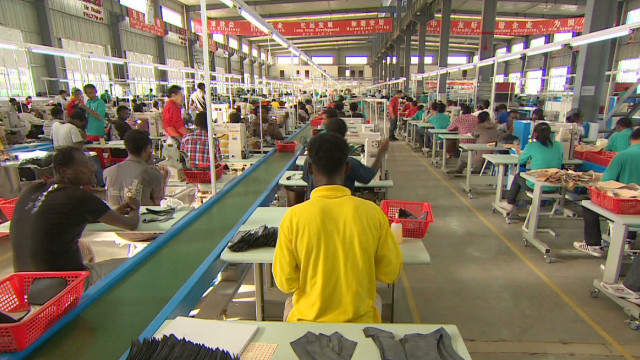Africa told to view China as competitor March 12, 2013 -- Updated 0746 GMT (1546 HKT) | CNN.com |

(Financial Times) -- Africa must shake off its romantic view of China and accept Beijing is a competitor as much as a partner and capable of the same exploitative practices as the old colonial powers, Nigeria's central bank governor has warned.
Reflecting the shifting views of a growing number of senior African officials who fear the continent's anaemic industrial sector is being battered by cheap Chinese imports, Lamido Sanusi cautions that Africa is "opening itself up to a new form of imperialism".
"China takes from us primary goods and sells us manufactured ones. This was also the essence of colonialism," he writes in the Financial Times. His remarks are among the most trenchant yet by a serving African official about the continent's ties with the world's second largest economy.
Trade between China and Africa was worth more than $200bn in 2012, 20 times what it was in 2000 when Beijing committed to a policy of accelerated engagement. It has been a period of strong growth partly thanks to Asian demand for African resources . But a boom in commodities, services and consumer spending has coincided with the relative decline of African manufacturing from 12.8 per cent to 10.5 per cent of regional GDP, according to UN figures.



African leaders and the African Development Bank have recently urged governments to work with each other to ensure they maximise benefits from relations with their leading trade partner, but they have traditionally cloaked their concerns in emollient diplomatic language.
In contrast Mr Sanusi has thrown down the gauntlet to Beijing. "China is no longer a 'fellow underdeveloped economy'," he writes. "China is the second biggest economy in the world, an economic giant capable of the same forms of exploitation as the west. China is a major contributor to the de-industrialisation of Africa and thus African underdevelopment."
An experienced private sector banker, Mr Sanusi is credited with cleaning up Nigeria's banking system after a crash that wiped out 60 per cent of bank capital in 2009. He has also given Nigeria's central bank a more activist role, providing concessional refinancing to banks exposed to manufacturers and small and medium enterprises struggling to service high-interest, short-term loans.
In his article, Mr Sanusi argues that African countries must respond to "predatory" trade practices -- such as subsidies and currency manipulation -- that give Chinese exports an advantage. He also says the continent must build infrastructure and invest in education so that African businesses can compete for continental trade as Chinese labour costs rise.
"China is losing that advantage as its economy grows and prosperity spreads," he writes. "Africa must seize the moment and move manufacturing of goods consumed in Africa out of China to the African continent ... I cannot recommend a divorce. However, a review of the exploitative elements in this marital contract is long overdue."
His comments come ahead of South Africa's hosting of a summit of Bric nations later this month. South Africa, the largest economy in sub-Saharan Africa, was incorporated into the bloc of Brazil, Russia, India and China last year.
South African President Jacob Zuma last week warned western companies to shed an old "colonial" mindset when investing in Africa and to stop warning against the embrace of China.
"China is doing business in a particular way and we think we can see the benefits," he told the Financial Times. "But we are very, very careful," he added, citing Africa's experience of colonialism. Such a relationship he said must "benefit both. And this is what we and China have been agreeing."
© The Financial Times Limited 2013
